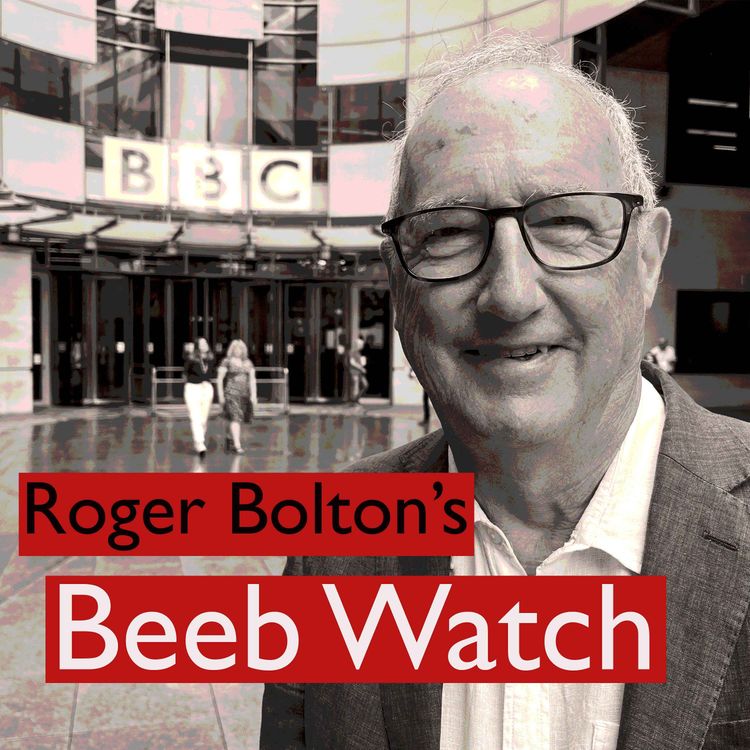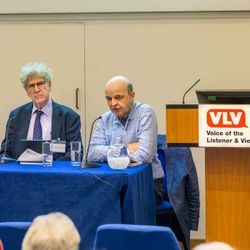Share

Roger Bolton's Beeb Watch
David Aaronovitch broadcaster and journalist on BBC coverage in the Middle East, BBC's role in public service media, cuts and journalism
David Aaronovitch, worked for the BBC in a senior capacity before becoming a writer for the Independent and later a columnist on the Times. He's made numerous documentaries and currently presents BBC Radio 4’s The Briefing Room. He publishes longer articles on his substack 'Notes from the Underground' and contributes to Tortoise Media. We discussed the complexities and roots of the current conflict in Israel and Gaza, BBC coverage of the war, the BBC's role in public service media, potential cuts and his departure from the Times and current interests.
"One of the big problems that I think that the BBC has had and other, is that they've not been able to be fully truthful about the circumstances under which they report from Gaza. I've really felt this incredibly strongly."
Please financially support the podcast by signing up here: www.patreon/BeebWatch
@BeebRoger
@RogerBolton@mastodonapp.uk
email: roger@rogerboltonsbeebwatch.com
More episodes
View all episodes

18. Prof Patrick Barwise Unpacks the BBC Green Paper and Trump’s Legal Threat
34:51||Season 10, Ep. 18Patrick Barwise is Emeritus Professor of Management and Marketing at London Business School, former chair of Which, the UK consumer organisation, and co-author of 'The War Against the BBC'.We review the government's newly published green paper on the BBC—covering its governance, funding models, independence, commercial and political influences, public accountability, what's missing and participation in the consultation. And we discuss whether the BBC should settle with Trump. “I would like to see the government literally saying, ‘We will fund that defence.’ I think that this is actually an opportunity for the government to demonstrate that we will not let our main public broadcaster be just sort of bullied in this kind of a way.”Listen to all our episodes here: https://podfollow.com/beebwatch To support our journalism and receive a weekly blog sign up now for £1.99 per month www.patreon.com/BeebWatch/membership @beebwatch.bsky.social@BeebRogerInstagram: rogerboltonsbeebwatchLinkedIn: Roger Bolton's Beeb Watchemail: roger@rogerboltonsbeebwatch.com
17. The British Academy BBC report: time for big changes
32:50||Season 10, Ep. 17Professors Georgina Born and Justin Lewis are co-authors of the British Academy report on the future of the BBC and public service media. From the UK to Scandinavia, Canada to Australia, the report presents evidence about what works and what doesn’t. We discuss some of their findings: the importance of democratic governance, the decline of the licence fee, and the need for independent funding mechanisms.We explore the role of public service media, the threat from global big tech, governance and political independence, alternatives to the licence fee, the idea of a permanent charter, strategies for engaging young audiences, and the need to develop new approaches to public service media in the digital age."The BBC has been built and developed over 100 years. It could be abandoned in one term of one government under our current structure, which I think we would all come to regret if it happened."Find the British Academy report here: https://www.thebritishacademy.ac.uk/publications/future-of-public-service-media/Listen to all our episodes here: https://podfollow.com/beebwatch To support our journalism and receive a weekly blog sign up now for £1.99 per month www.patreon.com/BeebWatch/membership @beebwatch.bsky.social@BeebRogerInstagram: rogerboltonsbeebwatchLinkedIn: Roger Bolton's Beeb Watchemail: roger@rogerboltonsbeebwatch.com
16. Jon Williams, ex-BBC Foreign News Editor, on Freelance Journalism, Media Challenges, and Lawsuits
26:20||Season 10, Ep. 16Jon Williams, Executive Director of the Rory Peck Trust, former foreign editor at BBC News, and managing editor of ABC News in the US and RTÉ. We discuss the work of the Trust; the challenges facing freelance journalists; the rise in deaths and imprisonment of journalists; dealing with propaganda wars and media companies; and how broadcasters should handle lawsuits.“As news organisations have got less and less money to base foreign correspondents overseas, then more and more they're turning to freelancers to fill that gap, and the awards are … both an act of recognition and an act of resistance to this climate of misinformation that we find ourselves in.”Find out more about the Rory Peck Trust: https://rorypecktrust.org/Listen to all our episodes here: https://podfollow.com/beebwatch To support our journalism and receive a weekly blog sign up now for £1.99 per month www.patreon.com/BeebWatch/membership @beebwatch.bsky.social@BeebRogerInstagram: rogerboltonsbeebwatchLinkedIn: Roger Bolton's Beeb Watchemail: roger@rogerboltonsbeebwatch.com
15. Dan Thomas, FT Global Media Editor on the Sky/ITV Deal and the Future of UK Media
30:18||Season 10, Ep. 15Dan Thomas is the global media editor of the Financial Times and its former business editor. We discuss the turbulence shaking up the UK media industry: the high-stakes merger talks between ITV and Sky – what that means for the future of public service broadcasting, the challenges posed by increasing media consolidation and what lies ahead for major players like Channel 4. We also discuss the current leadership crisis at the BBC and the potential impact of the government's long-awaited green paper."Sky buying ITV—you know, the biggest UK commercial public sector broadcaster—is massive. This wouldn’t have been thinkable, really, not so long ago. And it changes the whole public sector broadcasting landscape. It has huge ramifications for what happens to the BBC. It has huge importance for Channel 4."Listen to all our episodes here: https://podfollow.com/beebwatch To support our journalism and receive a weekly blog sign up now for £1.99 per month www.patreon.com/BeebWatch/membership @beebwatch.bsky.social@BeebRogerInstagram: rogerboltonsbeebwatchLinkedIn: Roger Bolton's Beeb Watchemail: roger@rogerboltonsbeebwatch.com
14. Stewart Purvis, ex-ITN Chief, Richard Ayre, ex controller of editorial policy at the BBC and Prof Stephen Cushion at the VLV conference
01:08:17||Season 10, Ep. 14At the Voice of the Listener and Viewer autumn conference, the second session chaired by former BBC World Tonight presenter Ritula Shah, dealt with enhancing impartiality in news. Professor Stephen Cushion, Director of Research and Impact at the Cardiff School of Journalism, Media and Culture, presented new research on impartiality standards in news, followed by a discussion on the implications of the rise of opinion-led TV and radio for audiences. The panellists, apart from Professor Cushion, included Professor Stewart Purvis CBE, former Editor-in-Chief and Chief Executive of ITN, and Richard Ayre, former Controller of Editorial Policy and Deputy Chief Executive of BBC News. They discussed the recent crisis, political appointments to public bodies, the role of Ofcom and its interpretation of impartiality rules, and the allocation of air time to political parties. There were also questions on global news in broadcasting, fact-checking, editorial guidelines, whether the Reith lecture should have been edited and governance.“Samir’s best is not good enough at the moment.”Subscribe to the VLV here: https://vlv.org.uk/
13. Mark Damazer, former BBC Trustee and Prof Steven Barnett at the VLV conference
33:18||Season 10, Ep. 13After a turbulent few weeks for the BBC, the Voice of the Listener and Viewer held a timely panel titled “What Next for the BBC?” at its conference on Wednesday. The speakers were Mark Damazer — former Controller of Radio 4, Deputy Director of BBC News, BBC Trustee — and Stephen Barnett, Professor of Communications at the University of Westminster.They tackled the growing crisis of governance at the Corporation: the politicisation of the BBC Board, the influence of political appointees and how shifts in governance over the years have reshaped the BBC’s independence. They explored the tension between board culture and structural reform, questioned the effectiveness of Ofcom’s oversight, and assessed proposals for a new, genuinely independent appointments body.They also faced questions on the BBC’s response to recent criticisms — including the Prescott memo - and the pressures facing BBC leadership. Subscribe to the VLV here: https://vlv.org.uk/
12. Andy Webb, Dianarama author on Princess Diana, BBC 'Cover-Ups' & Bashir
34:04||Season 10, Ep. 12Andy Webb is the author of Dianarama: The Betrayal of Princess Diana. We discuss his years-long investigation into the BBC Panorama interview with Princess Diana, the controversial methods used by journalist Martin Bashir, the ongoing questions of BBC accountability and transparency, and the significant challenges he faced accessing the BBC’s archives in pursuit of the full story."It could be plausibly argued that Diana would be alive today—64 years old, the grandmother of five kids—had the BBC, in April of 1996 or thereabouts, told her what they knew."Listen to all our episodes here: https://podfollow.com/beebwatch To support our journalism and receive a weekly blog sign up now for £1.99 per month www.patreon.com/BeebWatch/membership @beebwatch.bsky.social@BeebRogerInstagram: rogerboltonsbeebwatchLinkedIn: Roger Bolton's Beeb Watchemail: roger@rogerboltonsbeebwatch.com
11. Richard Ayre, former senior BBC Executive on BBC Resignations, Trump’s Legal Threats, and Broken Governance
36:16||Season 10, Ep. 11Richard Ayre is a former Controller of Editorial Policy and Deputy Chief Executive of BBC News, and later became a member of the BBC Trust. We discuss the BBC's crisis: how the organisation should respond to legal threats from Trump; the resignations of Tim Davie and Deborah Turness; the actions and inaction of the editorial guidelines and standards committee; and the wider impact on BBC journalism.Richard also explains the process for appointing a new Director General, the implications for Charter Renewal, and the failures of the current governance system."Ministers have the power now to insert onto the shortlist people of their own choosing, irrespective of what any independent panel says. It's corrupt. It invites corruption. We have to take all public appointments out of political hands, and that includes the non-executive directors of the BBC."Listen to all our episodes here: https://podfollow.com/beebwatch To support our journalism and receive a weekly blog sign up now for £1.99 per month www.patreon.com/BeebWatch/membership @beebwatch.bsky.social@BeebRogerInstagram: rogerboltonsbeebwatchLinkedIn: Roger Bolton's Beeb Watchemail: roger@rogerboltonsbeebwatch.com
10. Pat Younge, ex-BBC Chief Creative Officer, on BBC bias, broadcasting reform, and media power
31:36||Season 10, Ep. 10Pat Younge, former BBC Chief Creative Officer and board member at ITV Studios, responds to allegations of bias made against the BBC’s Panorama programme; outlines proposals from the British Broadcasting Challenge for renewing the BBC’s charter and ensuring its long-term independence and relevance; and discusses the impact of media consolidation by wealthy, powerful figures in the US and how this affects the UK media landscape, especially Channel 5. We also discuss broadcast funding models, governance reforms, the importance of universality and trust, the role of citizen assemblies and the prominence of news and current affairs. “The BBC is like the sun around which our entire broadcasting universe revolves. So we need to get the BBC right. If everything else is going to be right.” Find out more about the British Broadcasting Challenge: britishbroadcastingchallenge.com Listen to all our episodes here: https://podfollow.com/beebwatch To support our journalism and receive a weekly blog sign up now for £1.99 per month www.patreon.com/BeebWatch/membership @beebwatch.bsky.social@BeebRogerInstagram: rogerboltonsbeebwatchLinkedIn: Roger Bolton's Beeb Watchemail: roger@rogerboltonsbeebwatch.com